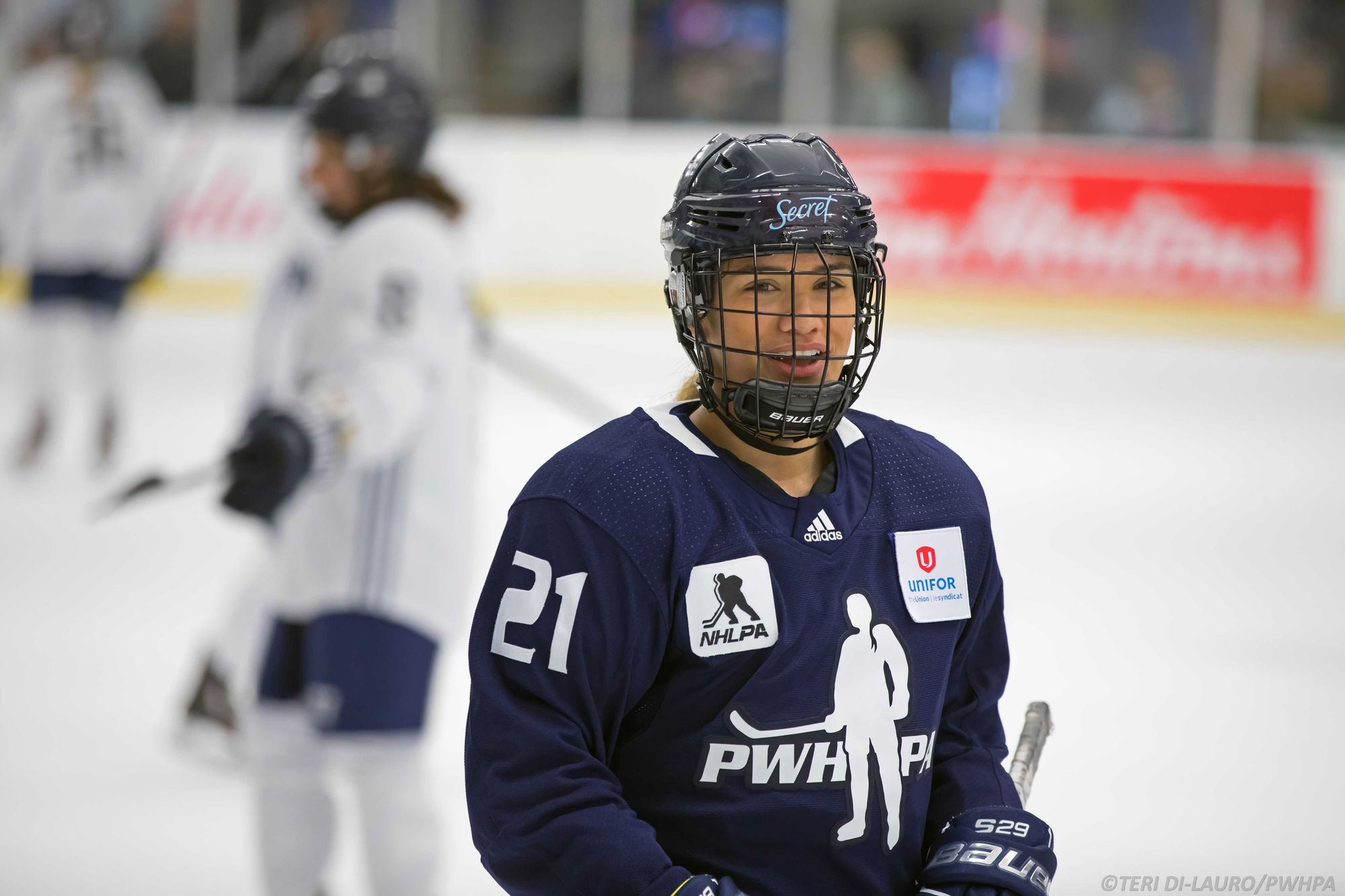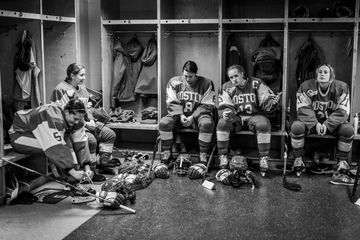By the fifth grade, Reagan Rust had it all mapped out. She'd drawn up a 10-year plan, which included such casual objectives as playing college hockey at Harvard University and becoming a brain surgeon. "I know," she says with a laugh. "I was an ambitious child." Neither would be simple goals for anyone, but things get a little more complicated when you grow up in a town with just one ice surface, rarely available for public use, and very few others for miles. It meant that as a little kid, Rust was already traveling three hours each way from her hometown of Southaven, Mississippi, in order to get in the game.
Fast forward a decade: things didn't wind up exactly as she had planned out. Rust spent her NCAA career between Rochester Institute of Technology and Boston University, and didn't study medicine ― but all things considered, she wasn't too far off. And though achieving her dream of playing Division I hockey involved regular 24-hour round trip commutes and moving far from home at an early age, it didn't even occur to her at the time that her path was particularly unusual or difficult.
"Whatever it took, that's what we were doing," she recalls, adding that the road trips were spent carpooling with friends. "It kind of just seemed normal. I knew people got more ice time than us, but it didn't seem like it was going to be a big difference."
When the constant travel began to take its toll, Rust relocated to Lake Placid, New York, for prep school. When that closed, she returned to the Pittsburgh Penguins Elite program she'd spent so many hours en route to and from, this time opting to stay with a local billet family rather than make the lengthy bimonthly drive. That mileage had everything to do with a lack of available ice close to home, something Rust sees as one of the greatest barriers to getting more kids from her state to succeed in the sport.
"It's really hard because the market isn't really down there yet," she explains. "They tried to have semi-pro teams like the SPHL and Central Hockey League teams in Mississippi, but they've folded time and time again. So it's been really hard to keep ice rinks up and going. For me, the nearest one before ninth grade was three hours away."
Though Southaven was home to a large multipurpose arena, for many years that was the only option around. Available ice time was limited to only an hour or two each month, which wasn't nearly enough to develop a young player. Whenever they did find free ice, Rust and her best friend ― who now plays Division III at Connecticut College ― scooped it up right away. Beyond the lack of facilities, the cost of entry is another big issue Rust identifies, with the price of basic necessities such as equipment adding up before the cost of travel even enters the picture. But having spent some high school summers training in Dallas, Texas, she sees a model for how, with the right infrastructure and support, hockey can thrive in the south.
"The ice rinks down there, there's like six of them," she notes. "There's always ice, there's a lot of people skating, the Dallas Stars are huge. They just have the opportunity to get better, which is what I really admired about Dallas."
Despite the long drives and the moves and her dedication to the sport, Rust didn't have too many NCAA options in front of her by the time her junior year of high school rolled around. She knew she could play Division III, but was holding out hope for DI, which she says was "kind of a far reach at that point." When RIT, recently promoted to the top division, eventually made her an offer, she was quick to accept. She spent two years in Rochester, where she was named to the College Hockey America all-rookie team and earned CHA all-academic honors in both seasons.
It was after that second year that USA Hockey, too, came calling. Ahead of the 2017 World Championships, the members of the U.S. national team had pledged to boycott the home competition in search of year-round financial support from their federation, basic provisions such as maternity protection, and some semblance of equality with the men's team (whose per diems, for instance, were more than triple the women's). As the tournament drew nearer, the governing body began a desperate bid to ice a replacement team. It began contacting players who'd been cut from the senior squad, girls from the U18 and development programs, college athletes, beer leaguers, and just about everyone in between with a tempting proposition: Would you like to play for Team USA?
Rust was among them. Her answer was no.
"I wouldn't say I really turned down USA Hockey, more so that I was standing up for the rights of the players that deserved to be there," she explains. Like any high-level athlete, she of course would've loved to play for the national team. But playing for the national team is meant to be a result of making the national team, and she felt that skipping that step in the midst of the protest would have been doing a disservice to those who had.
Following the 2017 season, Rust transferred to BU, where she rounded out her collegiate career. As a senior, after just one year with the Terriers, she'd already integrated herself well enough as a leader to be voted one of three team captains. She suited up in all of the team's 74 games during her time there, but her most notable performance came in the 2019 Beanpot tournament, where her shootout winner against Northeastern lifted BU to the final. She then netted the opening goal in the title contest against her childhood dream school, helping BU claim its first Beanpot title since 1981 ― before women's hockey was a varsity sport. It proved a strong enough showing to be inducted into the Beanpot Hall of Fame only a year after the fact.
As graduation approached, Rust once again had a plan. She was going to remain in Boston, and join the Worcester Blades of the now-defunct CWHL to continue playing hockey. "Once the league folded, I was just kind of in shock," she recalls. Players from the Blades kept her in the loop, though, and she opted to join the PWHPA in sitting out North American professional leagues this year.
"Honestly, no one knows for sure in these types of deals, but you have to try something," she says of her decision. "You can't just sit still, and as long as you're taking one step forward, that's okay. It's kind of just moving forward at this point ― we're trying to do something. We're not just sitting still and watching on the sidelines, we're actually pushing for something."
The Secret Women's Hockey Showcase marked Rust's professional debut, and was an opportunity for her to get to know more of the players she's been pushing alongside. Playing in a pro game is something she calls a dream come true, adding that it was cool to play with and against some of the top talent in the sport. She also points to the audience of little girls in the stands who were so excited to watch. "Because I guess they believe in it as much as we do," she said.
In her first year out of college, Rust works full-time for TJX Companies, squeezing in practices on Tuesdays and Thursdays with Monday and Wednesday lifts. She gets some extra ice time on the weekend, often with her alma mater. She keeps a morning routine and makes sure to fit in time for herself, but it's a constant balancing act. While Rust is up at 6:00 AM for work each morning, ice time is late at night, stretching out her days. And the twice-a-week practice sessions are far more spaced out than they were in college, which only adds to the challenge.
"What people don't really understand about women's professional hockey is that we're expected to put the best product on the ice, yet we're not treated like the NHL players," she notes. "But if we were, we could definitely move forward a lot faster. A lot of these girls are working 40 hours a week. We have engineers, we have teachers, we have allocation analysts like me, and it's hard to get better whenever you're putting another 15 hours on top of your 40-hour work week. And then making time for yourself and making time for sleep and making time to volunteer or go coach..."
When Rust looks at what she's doing just to play the sport she loves, she thinks about her future self. She imagines the opportunities she wants to see available should she ever have a daughter who dreams of playing hockey for a living. The question she asks herself is simple: "How do we want to be remembered in the end?"
A few weeks ago, Rust was in Minnesota for the U.S. Pond Hockey Championships, skating with a men's team. As she played she noticed some little girls, six or seven years old, noticing her, and she took a moment to go meet them. "It kind of just reminded me what I was doing," she affirms. When she considers her place in the sport, she knows she may not be familiar to everyone, but she's recognized where it counts most. "Even if I don't have a name," she says, "They have a face and they have someone that they can believe in."
(Photo: Teri Di-Lauro/PWHPA)



